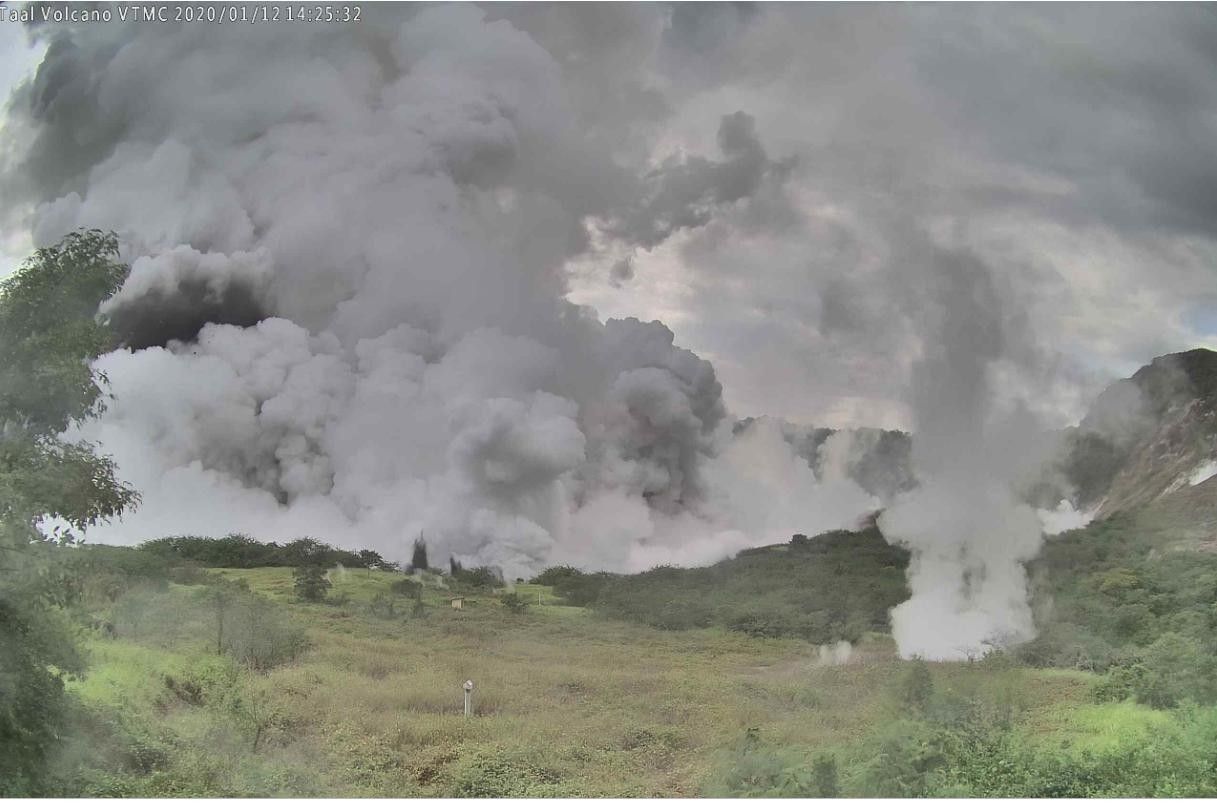Phivolcs warns of hazardous Taal Volcano eruption, raises alert level to 4

MANILA, Philippines (Update 4 8:28 p.m.) — Phivolcs further raised the alert level of Taal Volcano to 4 as the eruptive activity at the main crater continues to intensify, spewing massive plumes 10 to 15 kilometers-high that contain rock fragments and raining wet ashfall to as far as Quezon City.
"This serves as notice for the raising of the alert status of Taal from Alert Level 3 (magmatic unrest) to Alert Level 4 (hazardous eruption imminent)," Phivolcs said in its 7:30 p.m. bulletin Sunday. This means that hazardous explosive eruption is possible within hours to days.
State volcanologists said that as of 5:30 p.m., eruptive activity at the volcano's main crater intensified as continuous eruption generated a tall 10-15 kilometer steam-laden tephra column. Volcanic tremor was also recorded continuously since 11:00 a.m. and two volcanic earthquakes of magnitudes 2.5 and 3.9 were recorded.
"DOST-PHIVOLCS strongly reiterates total evacuation of Taal Volcano Island and additional evacuation of areas at high risk to pyroclastic density currents and volcanic tsunami within a 14-kilometer radius from Taal Main Crater."
The state volcanology bureau also said that civil aviation authorities must advise aircraft to avoid the airspace around Taal Volcano as airborne ash and ballistic fragments from the eruption column pose hazards to aircraft.
The state volcanology agency first raised the alert level from 1 to 2 in a bulletin released at 2:30 p.m following a phreatic explosion that spewed plume 100 meters high on Sunday afternoon. An hour and a half later, however, the agency further escalated the alert level to 3 indicating "magmatic unrest."
Alert level 3, which is listed as a "critical" alert level by the Official Gazette, signifies relatively high unrest as volcanic quakes and tremors may become more frequent. The alert level also indicates that "magma is close or at the crater. If the trend is increasing unrest, an eruption is possible within weeks."
"Lethal po ang gaseous component ng nirelease po na steam (aside from the fact that it’s super hot)," National Disaster Risk Reduction and Management Council spokesperson Mark Timbal told reporters.
"Kaya nireiterate ang reminder na off-limits ang main crater island as well as yung mga areas na nagkaron ng fissures."
Its initial alert status 2 meant moderate and increasing unrest or a low to moderate level of seismic activity that could eventually lead to an eruption.
Phivolcs in its 4 p.m. bulletin on Sunday said that “has escalated its eruptive activity, generating an eruption plume one kilometer-high accompanied by volcanic tremor and felt earthquakes in Volcano Island and barangays of Agoncillo, Batangas.”
The NDRRMC has warned the public that the entire volcano island is a permanent danger zone and is off-limits.
Phivolcs said increased steaming activity in at least five spots inside the volcano's main crater has been observed at around 1 p.m. today. The largest activity the bureau recorded was comprised of a phreatic explosion — a steam-driven explosion that happens when water beneath the ground is heated by magma, lava or hot rocks — that generated plume approximately 100 meters high. As of this writing, the volcano is reported to still be spewing ash.
High seismic activity since last year
Phivolcs said Taal Volcano's seismic network has manifested moderate to high level of seismic activity since March 28 last year.
"Some of these earthquakes were felt with intensity ranging from Intensity I (Scarcely Perceptible) to Intensity III (Weak Shaking) in the barangays of Calauit, Balete, Sitio Tibag, Pira-Piraso, and Buco, Talisay, Alas-as and Pulangbato, San Nicolas, Batangas. Often, these felt earthquakes are accompanied by rumbling sounds," the agency said in a bulletin issued at 2:30 p.m. Sunday.
The agency said three felt earthquake events were recorded Sunday at 07:35 a.m., 10:43 a.m. and 2 p.m.. A seismic swarm also started at around 11 a.m. and was ongoing as of 2:10 p.m.
The active volcano last erupted in 1977.
According to a bulletin by the NDRRMC, ground deformation and gas emission were observed in the wake of the eruption.
NDRRMC spokesperson Timbal told reporters that evacuation was ongoing in the municipalities of San Nicolas, Balete and Talisay as of 3:13 p.m. No figures on the evacuees have been offered as of this writing.
Timbal said that the provincial disaster management council's Taal Volcano contingency plan was being implemented.
Volcanic earthquake activity has been observed from Taal since March 26, 2019, NDRRMC said.
NDRRMC also reminded the public that the main crater of the volcano is strictly off-limits.
The highest alert level for volcanoes is level 6, which signifies full magmatic eruption. — with Franco Luna
- Latest
- Trending






























